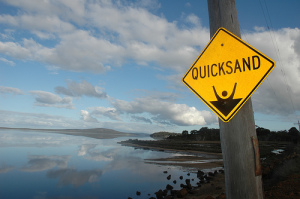
Help! I’m sinking in a morass of value judgments! — CC image “quicksand” courtesy of Mark Roy on Flickr. Some rights reserved.
I finished a drawing last week!
Actually, I finished two, I think… time to invest in fixative that doesn’t bill itself as being “workable.”
I’ve been stockpiling a growing folder of images that I wanted to use to draw from. With each one I’d think, “I’d really like to draw that, but…” When I opened my sketchpad, I was confronted with page after page of unfinished drawings.
Finally, I decided that before I could start any more new drawings, I’d have to finish the old, to the point where I would spray them with fixative. Any fixative, even “workable” fixative.
For a long time that resolution meant that I wasn’t drawing anything at all.
A couple of weeks ago, I pulled out the sketchpad again and realized how close to finished one of the drawings actually was. In the time since I’d started it, and the day I was looking at it, I’d been learning about different techniques I wanted to try, and this drawing was a perfect candidate.
I want to note for the record that I am not an artist. I’m a writer. I like to mess around with drawing, “just for me,” as I tell my friends, who are sometimes interested to see what I am doing. I don’t want to share my drawings partly because I have higher standards for my work than what I’m able to produce, and partly because people are usually prompted to share an opinion when they look at a piece of art. They do this when they look at a piece of writing too, which is why I’m allowed to make the current analogy.
Bad opinion — Bad!
With love, people: I’m not looking for an opinion.
I want someone to talk to me like a craftsperson. I’d like to hear about techniques, different choices, and skills I either have or can acquire. Instead, many people react to a piece of art as though they’ve been asked to provide reassurance. That is, they tend to respond like this when they look at a piece of art in person, with the artist. They don’t usually do this in a museum. In a museum you are much more likely to hear genuine critiques and deconstruction of a work. You’ll get to hear why they feel the way they do about a piece of art.
Details, details, details
The hallmark of a good critique is specific details. The most over-used and, to me, most frustrating adjectives imply a value judgment only, with no reference to why or how that judgment was formed. The piece is “good” — one of the most useless adjectives ever, right up there with “interesting.” “Good” tells me absolutely nothing. Why is it good? How is it interesting?
I would mind sharing less — of my writing, too — if people wouldn’t always respond in this way. If instead, they did what one of my friends, who saw my second newly completed drawing, did. She eyed it for a moment, and said, “I like how you made that part negative, brighter than everything else.”
I loved my friend’s comment so much because it was specific.
The enemy of the good
“Good” just invites us to compare ourselves to other artists and writers we think of as “good” (our own value judgments). We know where we stand in relation to their work. Most of the time, they are more skilled than we are, and we can point out in what ways this is so. Comparisons and value judgements are no good for my art. Specifics, on the other hand, are valuable, because I can gauge my work against itself — I’m not worried about anyone else.
Worrying about how we compare to other artists is a crippling disease. We need frequent booster shots to inoculate ourselves against this state of mind. Specific details are the booster. Remember this, the next time a friend asks you to look at his work.
When’s the last time you had your shot?
== == ==
Does anyone have suggestions on how to frame a preference for detail over opinion to their friends and acquaintances? I would love to hear your thoughts.

Hmm.. I agree, but I think if you surround yourself with people who are not already accustomed to providing the sort of critique to which you refer, you can’t really expect them to make that sort of qualifying commentary. I *think* more humans are not built in a way that this skill comes naturally. Of course, I don’t think it would offend anyone if, when asking for an opinion, you simply stipulate that you aren’t fishing for a (good/bad) review, but asking for impressions and specific detail. If they aren’t able to or interested in do(-ing) that, then you’ll know soon enough.. 8)
I agree that as the artist, we should surround ourselves with people who can provide us with the feedback we’re looking for. However, I also think it’s valuable for the friends and loved ones of the artist to have an idea of how this works. I can also reach further and say the skill for critique would benefit anyone in the workplace or positions of leadership.
We can all practice and learn 🙂